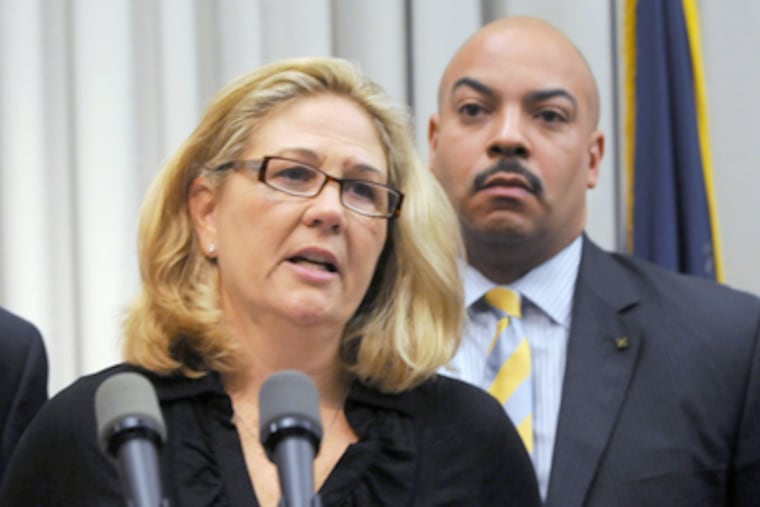The Pulse: No doubt on guilt, but fighting on was futile.
Maureen Faulkner's acquiescence to a sentence of life in prison without the possibility of parole for Mumia Abu-Jamal should mean exactly that.

Maureen Faulkner's acquiescence to a sentence of life in prison without the possibility of parole for Mumia Abu-Jamal should mean exactly that.
Her view was clear Wednesday when she stood with District Attorney Seth Williams as he announced that he would not pursue a new sentencing hearing for the convicted cop killer. And her decision should effectively end the three-decade legal battle, rather than give rise to a new effort to free the man who a jury determined killed Philadelphia Police Officer Danny Faulkner at point-blank range.
First, Abu-Jamal's guilt is not in doubt. Thirty years of attempts to overturn the jury's finding as to guilt have uniformly failed. He did it. And without relitigating all of the evidence that says so, just ask yourself if his brother, William Cook, who witnessed the murder, would have stayed silent all these years had he seen something suggestive of Abu-Jamal's innocence?
Second, no court has ruled that Abu-Jamal's sentence was unconstitutional. Instead, the Court of Appeals for the Third Circuit held that the instruction to the jury in the penalty phase was constitutionally flawed insofar as the possibility existed that the jury could have concluded that any finding of mitigating circumstances needed to be unanimous when, in fact, unanimity was not a legal requirement. Or, as Maureen Faulkner has called it, a "hair-splitting technicality."
And here's another important distinction:
There is no evidence that the jury was actually confused about anything. The specter of confusion is a defense-team canard that was never even raised in years of state appeals. Only when the case went to the federal level was this theory thrown at the wall, notwithstanding that there is zero evidence of any juror having been confused. A year ago, I tracked down and spoke with the jury foreman from the 1982 trial. He told me there was no confusion whatsoever on the part of those who deliberated Abu-Jamal's fate.
That's why, until Williams announced his decision Wednesday, the commonwealth remained able to sentence Abu-Jamal to death - again - so long as he was first afforded a new hearing. But that would have been an expensive lesson in futility.
I'm convinced Abu-Jamal would have again been sentenced to death, would have exhausted his state appeals, and finally would have found solace based on some new technicality on federal review. (Perhaps there would have been some question raised as to the vegetarian entrees available on his day of sentencing?) All of which explains why Maureen Faulkner recognized the futility of fighting further.
The sad reality is that she has been twice victimized, once by the man who murdered her 25-year-old husband, and again by a judicial system that prostrated itself for the benefit of defense lawyers willing to raise any claim, no matter how preposterous, to stand in the way of an execution.
Hugh Burns has seen it all in the last 30 years. He's the assistant district attorney who has been kept busy for years holding the underlying conviction intact. Last week, I asked him just how detail-crazy it had all become.
"My favorite is the Arnold Beverly hit man claim," Burns replied by e-mail. "Beverly, a man with evident mental problems, had gone to the defense during the 1995 [Post Conviction Relief Act] PCRA proceedings and claimed that rogue police had hired him to kill Officer Faulkner, and that some other officer had been on the scene and had shot the defendant in order to frame him for what Beverly supposedly did.
"Needless to say, everything Beverly said is flatly contradicted by the eyewitness testimony. The eyewitnesses did not know each other and had no way to coordinate their stories, as they all were promptly questioned by separate detectives within 30 minutes of the shooting."
One of Abu-Jamal's lawyers wrote a book and provided an inside account of the defense side of the PCRA effort. He recounted how Beverly had approached the defense and had been turned away, because his story was so ridiculous. They weren't about to embarrass themselves any more than they had already. When they sounded out Abu-Jamal on Beverly, he agreed. In the book, the lawyer gushed about how proud he was of Abu-Jamal for being too honest to exploit an obviously phony claim in an attempt to get out of his death sentence. That is, until he changed his mind, fired the lawyers, and later tried to raise the same defense in federal court!
No rational person familiar with the complete record of this case could ever conclude that doubt has been cast on the guilt of Abu-Jamal. Instead, a federal judiciary with a well-documented track record of opposition to the death penalty has, and always will, find a reason to deter the jury's desired outcome.
So the circus won't soon be coming back to town. Nor should it.